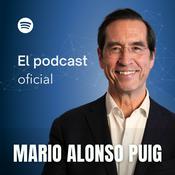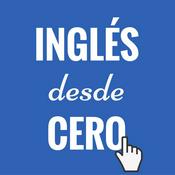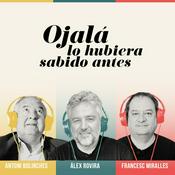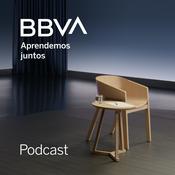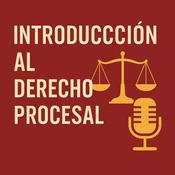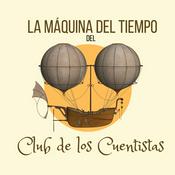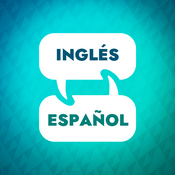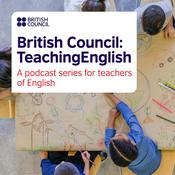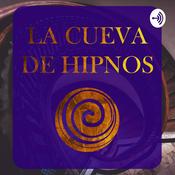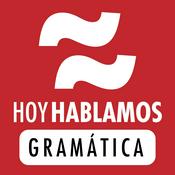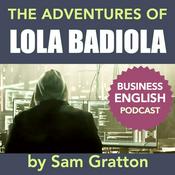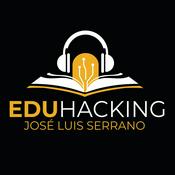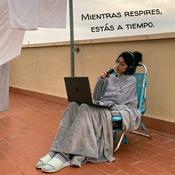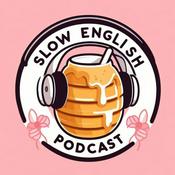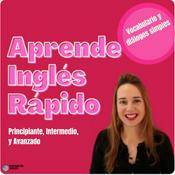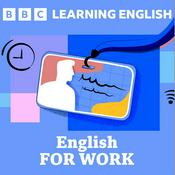104 episodios

4x04¡VA DE PRISAS!
01/11/2025 | 10 min
️ En este episodio de “ESPAÑOL EN 10 MINUTOS”, titulado “VA DE PRISAS”, Juan y dani ponen el turbo para explicarnos algunas EXPRESIONES COLOQUIALES relacionadas con LAS PRISAS Y EL ESTRÉS DEL DÍA A DÍA. Descubrirás expresiones tan naturales y divertidas como “IR CON LA HORA PEGADA AL CULO”, “IRSE CAGANDO LECHES”, “DARSE PRISA” y muchas más que los hablantes nativos usan cuando todo va demasiado rápido. Con su estilo claro y lleno de humor, te contarán QUÉ SIGNIFICAN, CUÁNDO USARLAS y CÓMO SONAR NATURAL en situaciones en las que el tiempo apremia.⏰ Un episodio rápido, espontáneo y lleno de energía, perfecto para quienes quieren HABLAR COMO UN NATIVO... ¡aunque sea corriendo! Recomendado para estudiantes de nivel INTERMEDIO Y AVANZADO (B1, B2, C1 y C2). ️In this episode of “ESPAÑOL EN 10 MINUTOS”, titled “VA DE PRISAS”, JUAN and DANI hit the gas to explain some COLLOQUIAL EXPRESSIONS related to BEING IN A HURRY AND DAILY STRESS. You’ll learn phrases like “IR CON LA HORA PEGADA AL CULO” (to be running late), “IRSE CAGANDO LECHES” (to leave in a rush / in a flash), “DARSE PRISA” (to hurry up), and many more expressions that native speakers use when everything moves too fast. With their usual humor and clear explanations, they’ll teach you WHAT THEY MEAN, WHEN TO USE THEM, and HOW TO SOUND NATURAL when you’re short on time.⏰ A fast-paced, energetic episode — perfect for learners who want to SPEAK LIKE A NATIVE, even when they’re in a hurry! Recommended for INTERMEDIATE AND ADVANCED learners (B1, B2, C1, and C2).

4x3 ¡VA DE RESIGNACIÓN!
24/10/2025 | 13 min
️En este episodio de “ESPAÑOL EN 10 MINUTOS”, titulado “VA DE RESIGNACIÓN”, JUAN y DANI nos enseñan cómo los hablantes nativos expresan RESIGNACIÓN en español. A través de EXPRESIONES COLOQUIALES como “QUÉ LE VAMOS A HACER”, “ES LO QUE HAY”, “AJO Y AGUA” o “QUÉ REMEDIO”, aprenderás a aceptar las cosas con humor, naturalidad y un toque muy español. Con ejemplos reales, explicaciones claras y su característico buen humor, los presentadores te ayudarán a entender CUÁNDO USAR cada expresión y QUÉ MATICES tiene en distintas situaciones. Un episodio ideal para aprender a SONAR MÁS NATURAL incluso cuando las cosas no salen como esperabas. Recomendado para estudiantes de nivel INTERMEDIO Y AVANZADO (B1, B2, C1 y C2). ️In this episode of “ESPAÑOL EN 10 MINUTOS”, titled “VA DE RESIGNACIÓN”, JUAN and DANI explain how native speakers express RESIGNATION in Spanish. Through COLLOQUIAL EXPRESSIONS like “QUÉ LE VAMOS A HACER” (what can you do), “ES LO QUE HAY” (it is what it is), “AJO Y AGUA” (suck it up), or “QUÉ REMEDIO” (there’s no choice), you’ll learn how to accept things with humor and a true Spanish attitude. With real-life examples, clear explanations, and plenty of laughs, the hosts show you WHEN AND HOW TO USE each expression naturally in conversation. A perfect episode to learn how to SOUND MORE LIKE A NATIVE, even when things don’t go your way. Recommended for INTERMEDIATE AND ADVANCED learners (B1, B2, C1, and C2).

4x02 ¡VA DE COCHES!
17/10/2025 | 12 min
️ ¡Arranca la CUARTA TEMPORADA de “ESPAÑOL EN 10 MINUTOS” a toda velocidad! En este episodio titulado “VA DE COCHES”, Dani y Juan exploran el mundo de las EXPRESIONES IDIOMÁTICAS relacionadas con los COCHES y la conducción. Descubrirás el significado de frases tan comunes como “ECHAR EL FRENO”, “IR TODO SOBRE RUEDAS”, y muchas otras que los hablantes nativos utilizan constantemente para hablar de la vida, el trabajo o las relaciones. Con ejemplos reales y explicaciones sencillas, aprenderás no solo el SIGNIFICADO, sino también CÓMO Y CUÁNDO USAR estas expresiones para que tu español fluya con naturalidad. Un episodio dinámico, divertido y lleno de vocabulario útil que te ayudará a HABLAR COMO UN NATIVO. Recomendado para estudiantes de nivel INTERMEDIO Y AVANZADO (B1, B2, C1 y C2). ️The FOURTH SEASON of “ESPAÑOL EN 10 MINUTOS” hits the road! In this episode, titled “VA DE COCHES”, Dani y Juan explore the world of IDIOMATIC EXPRESSIONS related to CARS and driving. You’ll learn the meaning of common phrases like “ECHAR EL FRENO” (to hit the brakes), “IR TODO SOBRE RUEDAS” (everything is running smoothly), and many more that native speakers often use to talk about life, work, or relationships. With real-life examples and clear explanations, you’ll discover not only the MEANING, but also HOW AND WHEN TO USE these expressions to make your Spanish sound more natural and fluent. A dynamic and entertaining episode packed with useful vocabulary to help you SPEAK LIKE A NATIVE. Recommended for INTERMEDIATE AND ADVANCED learners (B1, B2, C1, and C2).

4x01 "VA DE AGUA"
10/10/2025 | 11 min
️ ¡Empieza la CUARTA TEMPORADA de “ESPAÑOL EN 10 MINUTOS”! En este primer episodio, titulado “VA DE AGUA”, Juan y Dani se sumergen en el fascinante mundo de las EXPRESIONES IDIOMÁTICAS relacionadas con el AGUA. Descubrirás qué significa “ESTAR CON EL AGUA AL CUELLO”, cuándo algo “ES AGUA PASADA”, y muchas otras expresiones que los hablantes nativos usan en su día a día. Con ejemplos reales y explicaciones claras, aprenderás no solo el SIGNIFICADO, sino también CÓMO Y CUÁNDO USAR estas expresiones para sonar más natural y fluido. Un episodio refrescante para inaugurar una nueva temporada llena de energía, humor y mucho español auténtico. Recomendado para estudiantes de nivel INTERMEDIO Y AVANZADO (B1, B2, C1 y C2). ️ The FOURTH SEASON of “ESPAÑOL EN 10 MINUTOS” kicks off! In this first episode, titled “VA DE AGUA”, Juan and Dani dive into the fascinating world of IDIOMATIC EXPRESSIONS related to WATER. You’ll learn what it means when someone says “ESTAR CON EL AGUA AL CUELLO” (to be up to your neck in trouble), when something “ES AGUA PASADA” (water under the bridge), and several other natural Spanish expressions that native speakers use all the time. With real-life examples and clear explanations, you’ll understand not only the MEANING, but also HOW AND WHEN TO USE these expressions to sound more natural and confident in Spanish. A refreshing episode to kick off a new season full of energy, humor, and authentic Spanish. Recommended for INTERMEDIATE AND ADVANCED learners (B1, B2, C1, and C2).

3x36 ¡VA DE BRICOLAJE!
15/6/2025 | 12 min
En este episodio, DANI y JUAN se arman con su caja de herramientas ... ¡lingüísticas! Porque hoy vamos a descubrir un montón de expresiones coloquiales que vienen del mundo del BRICOLAJE, pero que usamos todo el tiempo sin necesidad de coger un taladro. Entre risas y ejemplos muy reales, nos explican frases como: - "FALTARLE UN TORNILLO a alguien": cuando alguien está un pelín fuera de lo normal. - "DAR EN EL CLAVO": cuando aciertas de lleno, ¡BINGO! - "ECHAR UN CABLE": cuando alguien te ayuda y no sabes si abrazarlo o invitarle a una caña . Y unas cuantas más que vas a querer usar desde ya. Ideal para estudiantes de nivel B2, C1 y C2 que quieren dejar de sonar “de manual” y empezar a hablar como auténticos manitas del español. ️ Dale al play y verás que no necesitas un destornillador para clavar estas expresiones. In today’s episode, DANI and JUAN bring out their language toolbox to explain everyday Spanish expressions that come straight from the world of DIY and TOOLS — no helmet required. You’ll hear super useful idioms like: - "FALTARLE UN TORNILLO a alguien" (someone's a bit... not all there ), - "DAR EN EL CLAVO" (when you totally nail it), - "ECHAR UN CABLE" (when you give someone a hand — no wires involved), And more gems you’ll want to steal for your next convo in Spanish. Perfect for B2, C1 and C2 learners who are ready to stop speaking like a textbook and start sounding like total pros. Hit play and get ready to hammer in some real-life Spanish — with laughs guaranteed.
Más podcasts de Educación
Podcasts a la moda de Educación
Acerca de Español en 10 minutos
Escucha Español en 10 minutos, Dr. Mario Alonso Puig y muchos más podcasts de todo el mundo con la aplicación de radio.es
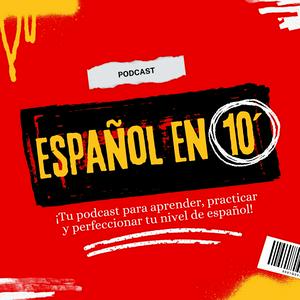
Descarga la app gratuita: radio.es
- Añadir radios y podcasts a favoritos
- Transmisión por Wi-Fi y Bluetooth
- Carplay & Android Auto compatible
- Muchas otras funciones de la app
Descarga la app gratuita: radio.es
- Añadir radios y podcasts a favoritos
- Transmisión por Wi-Fi y Bluetooth
- Carplay & Android Auto compatible
- Muchas otras funciones de la app


Español en 10 minutos
Descarga la app,
Escucha.
